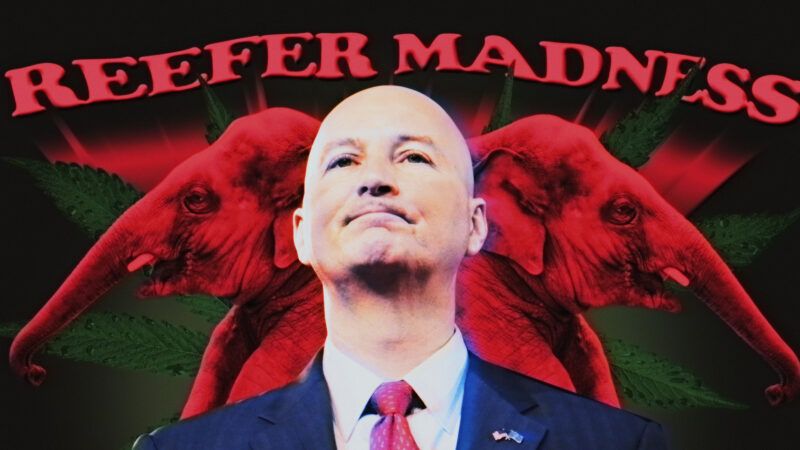The Return of Reefer Madness in the GOP
Certain politicians and pundits are living in a 1930s fantasy world.

Consider the following. You're sitting there, minding your own business at the five-and-dime, when a shady character approaches you with promises of a good time. "How good," you ask? "Really good," he responds. You're intrigued. Against your better judgment, you follow him tepidly as he escorts you through town into a dark building that leads to an even darker basement. Down, down, down you descend as the air becomes increasingly shriek- and skunk-ridden. You've arrived.
He holds out his hand and in it reveals a promise fulfilled: It's that smelly green flower, the key to a wild ride. It's the reefer.
"Why me?" you wonder. You, so unassuming in that blue bow-tie, those pleated khaki pants, those brown brogues! This isn't supposed to happen to people who wear light blue argyle sweater vests. You have limited time to mull your fate before a group of scantily-clad people slink out from the smoky billows—the screaming now makes sense. You're suddenly surrounded, mostly by shirtless men in Speedos. How strange, you think.
"Smoke the marijuana," says the token bottle blonde, her lips red and her lingerie green, the latter a fitting homage to Mary Jane. "Sail the sea of sin."
You oblige. You trade in that bow-tie for a bare neck, take a deep inhale, and the rest is history: You black out, lose your mind, accidentally kill a pedestrian while driving your car, and grapple with the fact that your dream of becoming a wholesome swing dance instructor is now over. You don a disguise and get out of dodge.
If that story arc sounds familiar, it might be because it's the plot, loosely rendered, of Reefer Madness—the 1936 propaganda film meant to scare kids away from smoking weed—which was later spoofed into a 2005 musical of the same name. It also might be because Newsmax host Greg Kelly allegedly went through a very similar experience and lived to tell the tale.
"SMOKING WEED (aka GRASS) is NOT a good idea," he tweeted late last month. "I've tried it (back in the day) and it was WORSE than anything that happened to HUNTER BIDEN. I 'toked up' with some buddies in Kentucky and woke up 4 days later in Nairobi, Kenya. With no idea what happened. DON'T DO DRUGS."
Relatable. Was that where our main character went into hiding?
Kelly's tweet does not appear to be facetious. That leads this writer to two possible conclusions. The first option: He was given something other than weed and hopefully ditched that crowd after returning from his African voyage. The second: He's drumming up another Reefer Madness-y panic to scare his followers away from weed.
Pot panic is experiencing a sort of resurgence these days, not just with Kelly, but also among somewhat mainstream politicians. Yet this gambit requires a whole lot of imagination, particularly at a time when people are waking up to the deleterious effects posed by the drug war and an overburdened criminal justice system.
"We have a drug problem in Virginia, and legalizing marijuana will only lead to more marijuana overdoses and deaths," said state Sen. Amanda Chase (R–Amelia County), who is running for the state's highest office. "Democrats want more marijuana deaths. As your governor I would never allow marijuana to be legalized."
Exactly which deaths Chase was referencing remains unclear. In May 2019, a coroner in LaPlace, Louisiana, reported that a woman died from too much THC—the psychoactive compound found in the cannabis plant. It was deemed what could have been the first marijuana overdose death in the history of the U.S., even though some experts refuted that as the cause.
"We know from really good survey data that Americans use cannabis products billions of times a year, collectively. Not millions of times, but billions of times a year," Keith Humphreys, formerly a senior policy adviser at the White House Office of National Drug Control Policy, told Nola.com. He noted that coroners sometimes blame a death on a drug found in the system when there is no other obviously apparent reason. "If the risk of death was one in a million, we would have a couple thousand cannabis overdose deaths a year."
We don't. Contrast that with alcohol use, which is responsible for hundreds of deaths per day.
Nebraska Gov. Pete Ricketts, a Republican, upped the ante in March: "If you legalize marijuana, you're gonna kill your kids," he said at an event for Smart Approaches to Marijuana (SAM), a group that does not deserve its name. "That's what the data shows from around the country." Ricketts may have lifted his data from Reefer Madness.
More clear, however, is that the drug war incentivizes actual violence, with sellers unable to litigate anything in court. Black markets encourage the proliferation of more dangerous drugs being passed off as things they're not, and give law enforcement the excuse to seize assets from people for no discernible purpose (with little recourse available to those people). Police also possess wide latitude to exercise deadly force against individuals wrapped up in such victimless crimes.
For the skeptic: Remember how well Prohibition—which outlawed a much more statistically lethal substance—worked out? In that same vein, violent crime in Baltimore decreased 20 percent between March 2020 and March 2021 after the city decriminalized drug use and prostitution. During the same period, crime skyrocketed nationwide.
No one is asking that Chase, Ricketts, and Kelly endorse the morality or prudence of drug use (that's for us to do). But they should still contend with real information in the real world, as opposed to tugging constituents back to a fictional one complete with more paranoia than you could ever have from lighting up a blunt.


Show Comments (59)